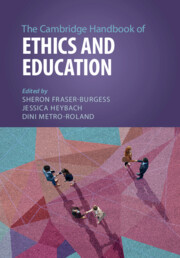Book contents
- The Cambridge Handbook of Ethics and Education
- The Cambridge Handbook of Ethics and Education
- Copyright page
- Epigraph
- Contents
- Figures
- Tables
- Contributors
- Foreword
- Preface
- Acknowledgments
- Part I Traditions in Ethics and Education
- Part II Ethics and Education in Practice
- Part III Emerging Ethical Pathways and Frameworks
- 28 Defining Moral Responsibility for School Leaders in Times of Democratic Crisis
- 29 Convivialism, Interdependence, and Education
- 30 New Existentialism
- 31 Antiracist Moral and Civic Education
- 32 A Decolonial Feminist Perspective
- 33 Ethics and Mindful Leadership in Education
- 34 Ethics as a Field Discipline in the Classroom
- 35 Centering an Environmental Ethic in Climate Crisis
- 36 Ethical Inquiry in Educational Research
- 37 Education and the Technological Horizon
- 38 Teaching in Credal Deep Pluralism
- 39 A Pragmatic Approach to Ethics in Education
- 40 Spectatorship, Black Bodies, and Urban Education
- Index
- References
36 - Ethical Inquiry in Educational Research
from Part III - Emerging Ethical Pathways and Frameworks
Published online by Cambridge University Press: 07 March 2024
- The Cambridge Handbook of Ethics and Education
- The Cambridge Handbook of Ethics and Education
- Copyright page
- Epigraph
- Contents
- Figures
- Tables
- Contributors
- Foreword
- Preface
- Acknowledgments
- Part I Traditions in Ethics and Education
- Part II Ethics and Education in Practice
- Part III Emerging Ethical Pathways and Frameworks
- 28 Defining Moral Responsibility for School Leaders in Times of Democratic Crisis
- 29 Convivialism, Interdependence, and Education
- 30 New Existentialism
- 31 Antiracist Moral and Civic Education
- 32 A Decolonial Feminist Perspective
- 33 Ethics and Mindful Leadership in Education
- 34 Ethics as a Field Discipline in the Classroom
- 35 Centering an Environmental Ethic in Climate Crisis
- 36 Ethical Inquiry in Educational Research
- 37 Education and the Technological Horizon
- 38 Teaching in Credal Deep Pluralism
- 39 A Pragmatic Approach to Ethics in Education
- 40 Spectatorship, Black Bodies, and Urban Education
- Index
- References
Summary
This chapter is organized according to two complementary sections. The first examines ethical practice as an extension of liberal humanism, a series of operating assumptions that present select claims of discrete subjects and individualized responsibility. Liberal humanism colludes with capitalistic claims of value and a foregrounding of articulated rights over and above any semblance of collective justice. From this frame extend a series of research practices that “make sense” in particular ways and according to procedurized claims of ethical practice. Part two engages with an alternative ethical practice that is termed “relational materialism.” Relational materialism refuses the governing processes endemic to liberal humanism in favor of an affirmative ethical practice animated by transformative potential – the resistive assumption that we might become otherwise through generating a future yet unknown. Rather than solely describing or reconstituting the normative status quo (as is seen in conventional research), relationally materialist inquiry begins with an ethic of refusal such that we might experiment with alternative ways of living that are not governed by the ubiquitous claims of liberal humanism.
- Type
- Chapter
- Information
- The Cambridge Handbook of Ethics and Education , pp. 758 - 776Publisher: Cambridge University PressPrint publication year: 2024

